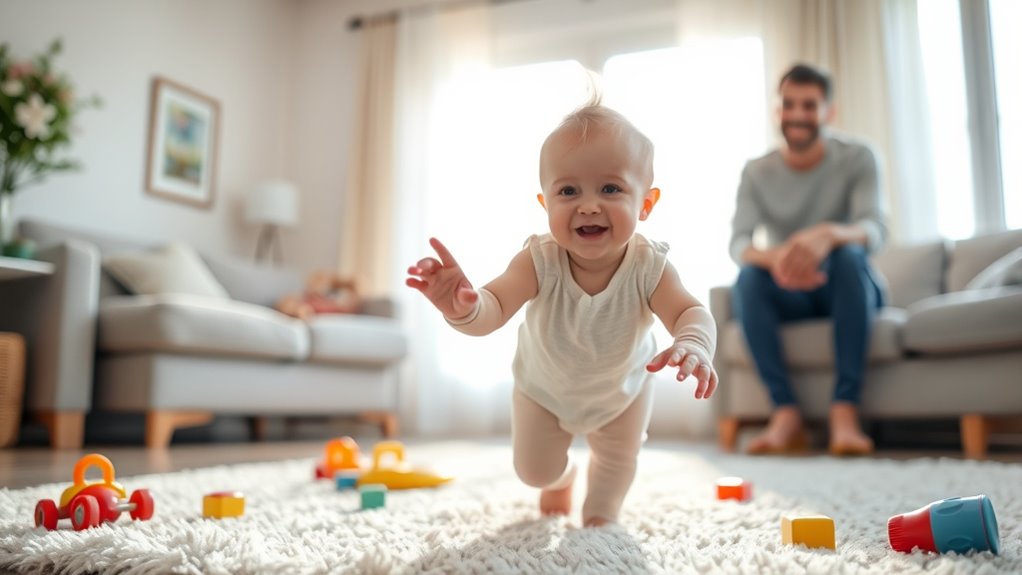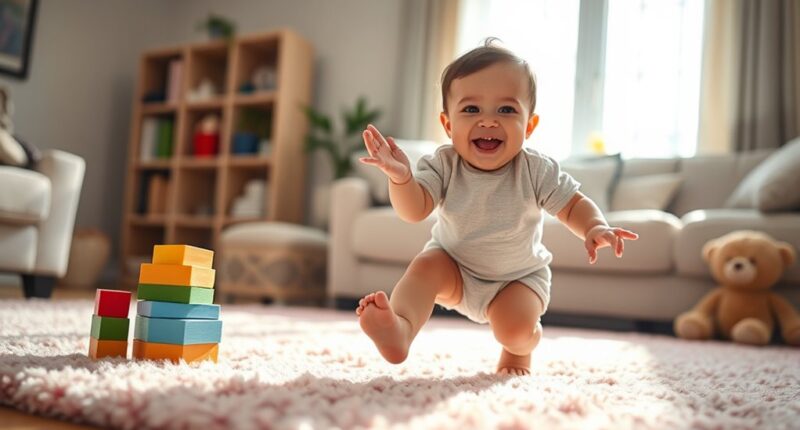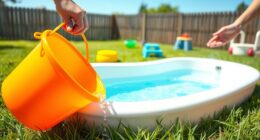Celebrating toddler milestones like walking, talking, and exploring helps boost their confidence and curiosity. As they grow, you’ll notice big achievements—taking steps, saying their first words, and more—that reflect their developing motor skills and communication. Recognizing these little wins encourages your child’s love of learning and exploration. If you pay close attention, you’ll see even more exciting progress and ways to support their journey every day.
Key Takeaways
- Celebrating milestones like walking and talking boosts toddler confidence and encourages continued development.
- Recognizing early achievements helps parents monitor growth and provides motivation for toddlers.
- Milestones such as first steps and words mark important stages in physical and language development.
- Supporting exploration through safe environment and praise enhances motor skills and communication abilities.
- Celebrating small wins fosters a positive learning environment and nurtures curiosity and self-esteem.

Have you ever wondered how your toddler’s development unfolds during these early years? It’s an exciting journey filled with tiny but significant milestones that show just how much they’re growing. During this time, you’ll notice rapid progress in language development and motor skills, both of which are essential for your child’s overall growth. These milestones aren’t just markers; they’re celebrations of your little one’s expanding abilities and curiosity about the world around them.
Discover the exciting milestones of your toddler’s rapid growth in language and motor skills.
When it comes to language development, your toddler begins to shift from simple sounds and gestures to more recognizable words and phrases. You’ll hear them start to mimic your speech and try to repeat new words, which is a key part of their language explosion. They might call out familiar objects, like “ball” or “dog,” and even attempt short sentences. This stage is fundamental because it helps your child build the foundation for effective communication. As they articulate their needs and thoughts, they gain confidence and learn how to connect with others. Encouraging their attempts—by talking back, reading together, and naming things—fosters their language skills and promotes a love for learning.
Motor skills also see remarkable advancements during this period. Your toddler goes from tentative steps to confident walking, often taking multiple strides with a sense of independence. You’ll notice them climbing onto furniture or trying to navigate stairs with your guidance, demonstrating improved balance and coordination. Fine motor skills also develop quickly; they begin to grasp small objects, turn pages of a book, and stack blocks with purpose. These movements may seem simple, but they’re essential for their cognitive and physical development, helping them explore their environment more effectively. Supporting these skills by providing safe spaces for movement and plenty of opportunities for hands-on play encourages their growth and confidence.
As your child masters new motor skills, you’ll see their curiosity blossom. They start to explore more actively, reach for objects, and even experiment with their own body movements. Celebrating these achievements, no matter how small, boosts their motivation and self-esteem. Remember, every child develops at their own pace, so patience and encouragement are key. Additionally, incorporating natural materials and eco-friendly toys into play can enhance their sensory experiences and support sustainable development. By fostering their language development and motor skills through daily interactions and safe exploration, you’re helping your toddler build a strong foundation for future milestones. Watching them take those first steps or say their first meaningful words is a reminder of how incredible this early stage of life truly is.
Frequently Asked Questions
When Should I Worry About My Toddler’s Developmental Delays?
If you’re wondering when to worry about your toddler’s developmental delays, trust your instincts and pay attention to parent concerns. It’s a good idea to schedule regular developmental screenings with your pediatrician, especially if your child isn’t meeting key milestones like walking or talking by expected ages. Early intervention can make a big difference, so don’t hesitate to seek professional advice if something feels off or if you have ongoing concerns.
How Can I Encourage My Toddler’S Language Development Effectively?
To encourage your toddler’s language development, create a language-rich environment by talking to them often and describing what you’re doing. Read aloud daily, using expressive voices and engaging stories to spark their interest. Sing songs, ask simple questions, and encourage them to imitate sounds and words. Your active engagement helps your toddler learn new vocabulary and develop communication skills, making language learning fun and effective.
What Are Some Signs of Early Motor Skill Issues?
If you’re concerned about early motor skill issues, watch for signs like gross motor delays, such as difficulty crawling, standing, or walking steadily. Fine motor concerns might show up as trouble grasping objects, poor hand-eye coordination, or difficulty using utensils. These signs could indicate developmental delays, so it’s important to consult your pediatrician for an evaluation and guidance on supporting your child’s motor development.
How Does Nutrition Impact My Toddler’S Milestone Progress?
You might wonder how nutrition impacts your toddler’s milestone progress. A nutritional balance provides essential vitamins and minerals that support healthy growth and development. If your child’s diet isn’t well-rounded, consider dietary supplements to fill gaps. Proper nutrition fuels energy and brain development, helping your toddler reach milestones like walking and talking on time. Ensuring a balanced diet can make a significant difference in their overall progress and wellbeing.
Are There Activities to Promote Social Skills in Toddlers?
You can promote social skills in your toddler through fun playdate ideas like sharing activities and cooperative games. These interactions help your little one learn how to take turns, communicate, and build friendships. Encourage activities such as pretend play, storytime, or simple group games that foster teamwork and empathy. By creating positive social experiences, you help your toddler develop essential skills that will benefit them throughout life.
Conclusion
Every milestone, from a first step to a simple word, marks a beautiful chapter in your toddler’s growth. Remember, each tiny win is a testament to their unique journey. For example, imagine your little one taking that first unsteady walk—your heart swells with pride and joy. Cherish these moments, because they pass quickly. Keep celebrating every achievement, no matter how small, and enjoy this precious time of discovery and development together.









